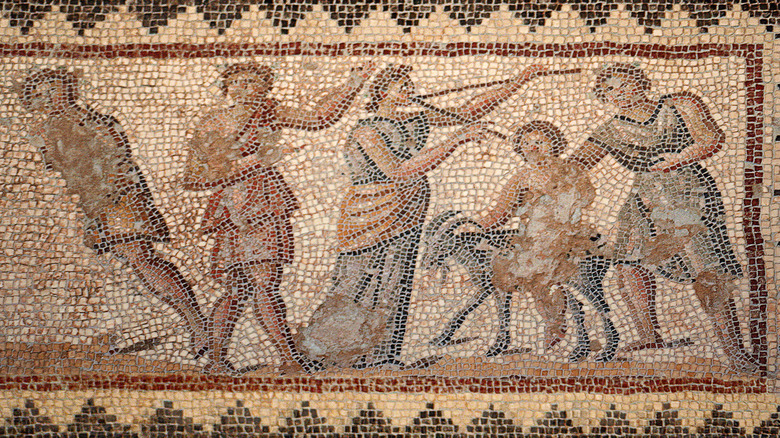Did The Ancient Greeks Actually Use Marijuana?
Ancient Greece: birthplace of Athenian democracy, home to philosophical giants like Plato and Aristotle, epic poets like Homer, and ... what's that? Wheeeeeee I'm flying! Here, Oracle at Delphi, have another hit of this chthonic chronic.
It makes sense, doesn't it? Plenty of cultures around the world have smoke-'em-up traditions, some ancient and some modern. Folks in rural China circa 2,500 years ago used to burn cannabis at funerals and inhale the vapors (via Wired). Various Native American tribes smoked weed for its medicinal properties, psychological benefits, and to aid in peace talks (via Life Civilized); a much better solution than bloodshed. At present, Peruvian shamans go one step further into true psychedelic territory by peddling ayahuasca retreats to wealthy Westerners (via The Guardian).
So if Ancient Greek myth and history is filled with stories about oracles and seers, Dionysian mystery cults, mystical musicians like Orpheus, and more, do you figure that folks might have been stoned a bit? The short answer is yes, at least by prevailing wisdom, if not hard historical records. Case in point: Our modern word cannabis comes from the Greek verb "cannabeizein," which literally means "to smoke cannabis" (per "Cannabis and the Soma Solution," excerpted at The Delphi Guide). Kind of an open-and-shut case, right? And yet, some of the more (presumably stuffy) scholars of antiquity state, "Since mention of [cannabis'] psychotropic properties is so sparse, either the Greeks must not have valued it or used it very little for that purpose." But does a text, like, need to say that ice is cold?
Ain't no party like a Scythian party
To get a grasp on the sticky-icky of yore, we've got to look at the cultures surrounding, living within, and interacting with, Ancient Greece. Top of the list is the Scythians, a group of horseback-riding nomads who lived in the steppes of Central Asia, particularly the Altai region, and flourished between the 7th and 3rd centuries BCE (per the World History Encyclopedia). The Scythians lived almost exactly where and when cannabis plants such as Cannabis sativa evolved, as Live Science explains, and it was likely the Scythians who carried pot east to modern-day China and west to the Middle East, where it got traded to all other destinations. We've even got hard archaeological evidence of opium and cannabis residue in Scythian vessels, as National Geographic describes.
Scythians were employed in ancient Athens as resident aliens in their domestic police forces, as The Delphi Guide states, and it stands to reason they brought some of their "culture" with them. Scythian tribes were also closely related to the Thracians from western Russia and Turkey, who themselves inspired prominent, ritually ecstatic characters in Greek myth, like the aforementioned Dionysus and Orpheus. The Thracians called their shamans Kapnobatai ("smoke-walkers"), and they did things like burn hemp to "induce visions and oracular trances." On that note, it's also possible that hemp was the source of "Scythian fire" used as an incense in the cult of Asclepius, the Greek god of healing.
Rocking like it's 420 ... BCE
We've got plenty of other examples illustrating the commonplace use of cannabis and other mind-altering drugs in Ancient Greece. As The Delphi Guide tells us, Greek historian and "father of history" Herodotus uses the verb methyskesthai — "to become inebriated through drug use" — when talking about folks on the island of Araxes getting high. The famed Oracle of Delphi, Pythia, inhaled a burning mixture of "grains, hemp, and laurel over an oil lamp in an enclosed space" in order to induce visions. Orphic cults, named after the mystical musician Orpheus, performed their hymns under the influence of "highly pungent, psychoactive substances." And moving away from recreational use, cannabis was also used medicinally to treat "inflammation, earache, and edema."
In the end, there's no doubt that the Ancient Greeks were more than familiar with the old 420. And yet, ancient drug use continues to be a topic that many historians want to avoid because it carries with it the scent of something academically illegitimate. This is especially true in the context of a civilization like Ancient Greece, which has been given a thick coating of romanticized and unrealistic sophistication, as though all Ancient Greeks strolled around cobblestone streets pontificating about art while absently-mindedly plucking lutes. And of course, we have thousands of years of Western Christian morality to contend with. Such scholars, though, might want to, like, chill out.


